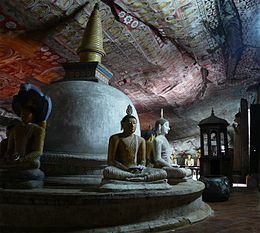This article needs additional citations for verification. (January 2015) |
| UNESCO World Heritage Site | |
|---|---|
 | |
| Location | Dambulla, Matale District, Sri Lanka |
| Reference | 561 |
| Inscription | 1991 (15th Session) |
| Coordinates | 7°51′24″N 80°38′57″E / 7.85667°N 80.64917°E |
Dambulla cave temple (Sinhala: දඹුල්ල රජ මහා විහාරය, romanized: Dam̆būlla Raja Maha Vihāraya; Tamil: தம்புள்ளை பொற்கோவில், romanized: Tampuḷḷai Poṟkōvil), also known as the Golden Temple of Dambulla, is a World Heritage Site (1991) in Sri Lanka, situated in the central part of the country.[1] This site is situated 148 kilometres (92 mi) east of Colombo, 72 kilometres (45 mi) north of Kandy and 43 kilometres (27 mi) north of Matale.
Dambulla is the largest and best-preserved cave temple complex in Sri Lanka. The rock towers 160 m over the surrounding plains. There are more than 80 documented caves in the surrounding area. Major attractions are spread over five caves, which contain statues and paintings. These paintings and statues are related to Gautama Buddha and his life. There are a total of 153 Buddha statues, three statues of Sri Lankan kings and four statues of gods and goddesses. The latter include Vishnu and the Ganesha. The murals cover an area of 2,100 square metres (23,000 sq ft). Depictions on the walls of the caves include the temptation by the demon Mara, and Buddha's first sermon.
Prehistoric Sri Lankans would have lived in these cave complexes before the arrival of Buddhism in Sri Lanka as there are burial sites with human skeletons about 2700 years old in this area, at Ibbankatuwa near the Dambulla cave complexes.
- ^ Golden Temple of Dambulla, UNESCO
